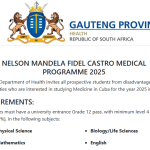Written and submitted by Shan Ronald a medical school graduate
When you decide that you are going to study medicine and become a doctor, you’re not making a choice, you’re making a commitment. It’s not something you should go into casually, and it’s difficult to really have a feeling of what you’re getting yourself into just from casual observation. If you’re inclined to follow your heart and get into the field, do a little research first, including some type of work in the field. That way, you’ll have more than just a romantic notion of what it will be like to become a doctor. To get you started, here’s just a taste of what the process of becoming a doctor will be like.
Education First :While many fulfilling careers require a higher education, you will need a higher higher education to become a doctor. After you complete a science-based pre-med program at a university, you will have to pass a test to be able to apply to a medical school.
If you are accepted to a medical school, prepare for four years of hard work that will include intensive studying followed by practical experience in the hospital. But don’t feel as if your whole life will be consumed by hard work. Since most medical schools are located in major cities, you will have plenty of opportunities to develop socially and culturally while you are working toward your future. Not only that, but medical school, by its very nature, encourages camaraderie and bonding among students, and lifelong friendships are forged. After you finish this portion of your preparation, you will move on to three to seven years of internship and residency, where you can concentrate on a specialty.
Extracurricular Activities
Depending on the institution you attend, you may have access to a varied assortment of activities to help you blow off steam after studying or working in the hospital. There are student societies that organize events such as dances, parties, field trips, etc. If you feel you have time, you can even get involved with these societies yourself. There are also student publications, community outreach programs, and even sporting events, in some cases.
Since most campuses are aware of the importance of creating a balance between work and the rest of your life, they make an attempt to address as many potential student interests as possible. If you like to perform, you may be able to take advantage of musical organizations, theater, or dance. If you’re a political animal, you can engage in activities to promote a party, work for animal rights, clean up the environment, etc. People of different cultures and faiths can find organizations they can join where they will feel comfortable among others who share their ideals.
Student Support
When you attend a university, you will probably appreciate the Student Unions that look out for the interests of all students. These organizations are a separate body from the university, so they can promote ideas for enriching the experience of the students. Some issues they may address are the standards for the facilities, the quality of the lecturers, and any other concerns that arise.
Aside from the legislative function of the Student Unions, they also provide advice on welfare issues through the Student Advice Center, or Welfare services. They deal with issues such as finance, housing issues, immigration problems, and much more.
Social Life
Social Life is very important for all young people, and medical students are no exception. While the student unions organize all the activities mentioned earlier, it’s interesting to note that they also manage their own student bars and night clubs. After hours or days of intense work, it’s very important to have a place where students are able to relax and unwind with friends in a safe environment. There are even a variety of shopping opportunities run by the student unions.
Support
Because your time spent at medical school can be stressful, it’s good to know that there is a strong support system to handle problems you encounter, whether personally or in your studies. These support systems consist of student committees, medical school staff, 24-hour hotlines, pastoral and chaplain support, personal tutors, international services, services for students with disabilities, general counselors, and security.
Once you’ve made the commitment to pursue a career in medicine, the outlook can seem a little daunting. But if you know what you’re getting into and you are aware that you’re not alone, a little perseverance (and a lot of time management) will get you through your medical school years and on to the medical career you dream of.
Author Bio: Shan Ronald is a medical school graduate who is an enthusiastic blogger and holds an editorial position in GMATE a test prep provider that offers exam preparation courses for GAMSAT.










